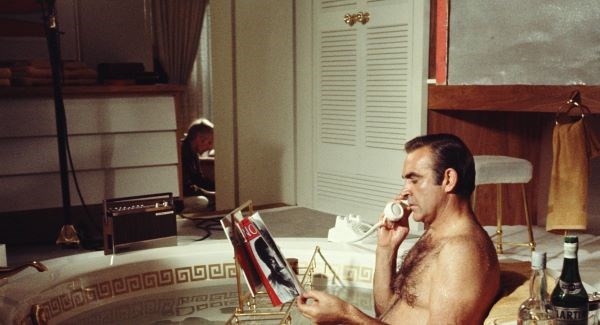What secret agents need to work successfully

The core capital of modern companies are their employees. This fundamental truth is even more important for companies operating in areas that require highly trained and motivated people with a high degree of initiative. It is not just software companies that fit perfectly into that scheme, but almost any engineering-driven company and many, many companies outside classical STEM fields. After all as Humphrey Watts said: “Every business is a software business”. In the article “The James Bond Package” I wrote how having someone with the skills and mentality of James Bond in your company helps a lot when solving complex problems is daily business. However getting James Bond to work for you and then be able to unlock his full potential needs a company culture that fits the modus operandi of a secret agent.
The MI-6 operating model
James Bond works for the British Secret Service, often called MI-6. While this is a governmental service it bears closer resemblance to a large, internationally operating company than to a typical governmental bureaucracy. MI-6 is organized in different sections responsible to run operations in different parts of the world and special branches such as the 00-branch, Q- and I-branch. Each branch contains people with talents and skills fitting the branch. (James Bond obviously being a member of the 00-branch.) Branches are operating across all sections, in fact in many of the movies 007 is actively sent to cooperate with people from different sections. This sounds very much familiar to a lot of multinational “matrix-organized” companies.
The British Secret Service operates hidden from the public eye, but even MI-6 has it’s bunch of stakeholders. Essentially all the people benefiting from not having the world destroyed by a madman-billionaire or a secret crime syndicate are the stakeholders of James Bonds work. Even if not the whole world is at stake, then there are at least some politicians or the British government as a whole who are very much interested in the outcome of the clandestine missions.
To be able to operate as intended, MI-6 has to be capable to work as an independent organization - despite being fed by taxpayers money. So like a company MI-6 has to be self-sufficient in all aspects of running its own operations. Running this operations of course needs people orchestrating - managers - and people executing the work - such as the 00-agents.
The missions displayed in the typical Bond-movie show that MI-6 relies on skilled and talented people such as James Bond to complete the work. There are of course technical gadgets and supporting infrastructures to get the job done, but the brunt of the work and creative problem solving has to be done by people. To unlock the motivation and skills of the agents doing most of the the work, MI-6 had to adopt a mindset and operating principles that are very atypical for government agencies and more at home in modern, people-centric companies
Slack time at MI-6
Saving the world is a high-stakes, high-reward job that is very demanding for the people doing it, so the British Secret Service goes to great length to treat its workers well. This shows in the day to day things when James Bond is on a missions, as it’s always made sure that he receives all the creature comforts he can get if the situation allows for it. The most expensive suites in the finest hotels, luxury cars and those expensive, custom-prepared martinis are the secret-agent’s equivalent of having free coffee, ergonomic chairs and good computing equipment for a software developers. . Said this, just providing a drawer of sweets and comfy chairs is enough to get people motivated, but it is a start to creating a work environment that lets people focus on their work and helps them refilling their batteries once in a while. Even more important than the daily comforts is allowing people to take a break from their high-stake work regularly - even James Bond only goes on a mission every 2-3 years on average. This of course does not just mean slacking of on a beach, but can also mean just a break from the daily routine such as training or working on something else that is less strenuous for a time. This slack time helps creates a sustainable pace which is elementary if people should perform over a long time.

Slack time is important
Support for secret agents
Taking care of MI-6’s secret agents needs does not happen magically, it is done by people working in supporting branches. Everything James Bond needs on his missions is organized for him. Very rarely are his needs questioned, mostly it is assumed that if an agent requests something he has good reasons for it. This trust-based mentality translates very well to an agile working mode where empowered teams should be able to acquire the necessary infrastructure and services to get their job done quickly. If engineers that are aligned to a product-goal say they need access to a certain software to bring a product forward, they very likely correct. MI-6 goes step further than just providing what is asked. The supporting branches are proactively supporting their agents. For instance Q never asks what James Bond needs, but rather presents him with the gadgets that allow him to complete his mission - no negotiation about the budget or haggling about resources is involved. This works because the supporting personnel know the work of the agents very well, sometimes even with hands-on experience such as Miss Moneypenny being handed over a sniper rifle and being sent to the field to shoot at some villain.

Miss Monneypenny doing fieldwork in “Skyfall”
Focus, focus, focus gets the mission done
This working environment is a large part of the success of James Bond, as it helps him focusing his energy on the important tasks at hand but all this performance optimizing actions are nothing without focus. By stating its goal and intentions explicitly and pursuing them relentlessly MI-6 helps creating such a focus. The mission of MI-6 is “We work overseas to help make the UK a safer and more prosperous place”; this quite explicit mission statement helps James Bond to reevaluate all his actions time and time again. Does stopping Mr. Goldfinger make the UK a safer and more prosperous place? No question about it.
James Bonds missions are of course much more specific than “making the UK more safe”, but they all tie very well into that goal. Having an explicitly - and an accepted - mission statement in a company helps people to align themselves to it and lets them recognize the constraints in which they work. This is always a good thing, and even of more importance if people work as independently as James Bond.
Once James Bond is sent on a mission the only thing that matters is that the mission is completed, the how takes second or even third place. It is also left entirely to the secret agents on what kind of solution they find to complete the mission, the result is what counts. This freedom of action, explicitly granted to James Bond with the “license to kill” is another important factor that empowers the 00-agents. While in reality we might not want to give developers the license to kill, we nevertheless want to give them enough power to solve problems.

Trusts your agents
Focus on goals and empowering its agents to chose their methods are the core values of MI-6 and distill to Trust in its well trained, highly skilled and motivated employees to get the job done. Having a high alignment, a sustainable work environment and the people with the mentality to perform in it is all worthless if people are not given the freedom to solve problems as they see fit. And this needs a huge amount of trust between employer and employee. James Bonds “license to kill” gives him great power but it is also trusted that he uses that power responsibly. On the other hand James Bond can rely on his employee to not been left hanging if things go wrong. Even when in a tight spot such as in a secret prison somewhere in Korea he knows that MI-6 will take action to get him out of there.
This mutual trust between employee and company is what makes the different between being a successful, high performing secret agent - or software developer - or just another henchman of the villain. It requires constant work and transparency between the operatives and the management. Misuse of this trust can have severe consequences for either side. It is no coincidence that the fallen agents that James Bond faces all cite a feeling of betrayal on the hands of M or the MI-6 as motivation to destroy the world.
But once this trust is gained and being kept - by continuously renewing and reinforcing it - having such a trustful environment allows people to unlock their full potential. A very worthy goal to pursue. If MI-6 can trust James Bond to get the job done, we can do the same with our engineers.
This article is part of a series from my talk double-o-agile (PDF slides)
Thumbnail image source: https://wallpapercave.com/w/nn6fDQN